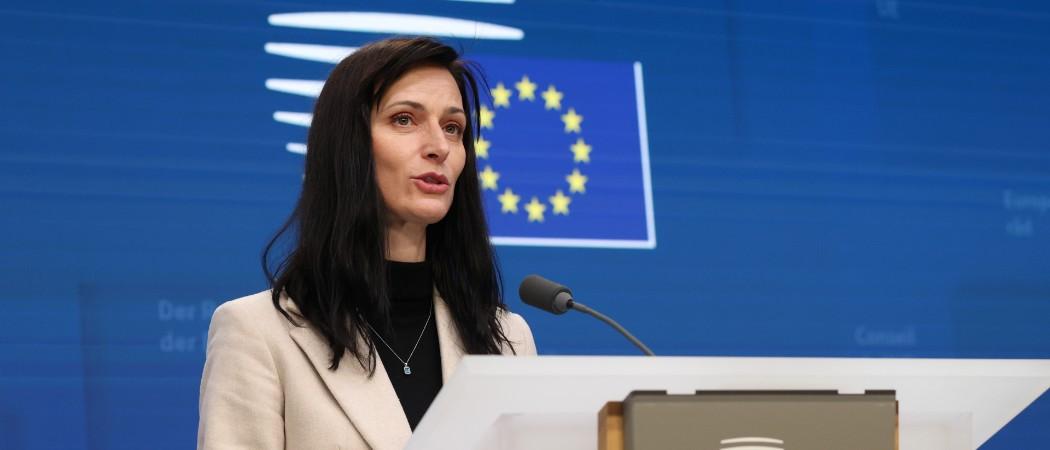The EU has been working to improve research infrastructures for years. Now, new council conclusions look to reduce fragmentation and improve access

EU research commissioner Mariya Gabriel speaking at the Competitiveness Council meeting on 2 December. Photo: European Union
EU science ministers have adopted council conclusions on upgrades to research infrastructures that will build on previous efforts to improve Europe’s big science facilities.
“We have a lot of riches in our research infrastructures, but it’s still a fragmented system, and we need a more potent ecosystem, something that is more efficient, guided by needs and particularly the green and the digital transitions,” EU research commissioner, Mariya Gabriel, told the ministers during the EU Council of member states meeting.
Most of the heavy lifting on large scale facilities has been done by the European Strategy Forum on Research Infrastructures (ESFRI), set up in 2006, where member states and other stakeholders define roadmaps for developing pan-European infrastructures. The council conclusions build on ESFRI’s work and signal member states’ readiness to put their weight behind improving science infrastructures across the bloc.
This is a milestone in efforts to create a continent-wide single market for research, the European Research Area (ERA). “Research infrastructures are the backbone of any work done by European researchers, and also a way of attracting talent from other parts of the world,” said Gabriel.
Jana Kolar, chair of ESFRI, said the Council’s conclusions are comprehensive and ambitious. ESFRI already has 14 expert groups working on delivering on the plans by the end of next year.
One of the first priorities is to deal with the added stress the energy crisis has put on the system, with energy intensive research infrastructure such as synchrotrons, neutron sources and high performance computing facilities facing staggering bills. This has already led some to reduce capacity, while others plan temporary shut downs.
“The conclusions are very ambitious, touching on very relevant issues including the energy crisis,” Kolar said. “Regarding the energy crisis, the council conclusions call on ESFRI and research infrastructures to elaborate on scenarios to manage possible crises, including energy supply difficulties.”
Competitiveness Council’s conclusions set an ambitious and elaborated vision for the development of #researchinfrastructures. The breadth of tasks put before @ESFRI_eu demonstrates the Council’s trust in its efficiency and processes. ERA at its best. https://t.co/6LQYT1BgrJ pic.twitter.com/2WPaKb3a5G
— Jana Kolar (@kolarjana) December 5, 2022
A drafting group will meet on Wednesday, to figure out the extent of the problem and how to best address it. Kolar noted this is linked to the environmental impact of research infrastructures, another priority area for improvement.
The League of European Research Universities (LERU) welcomed the conclusions, in particular, the explicit reference to support for research infrastructures of all sizes. Kurt Deketelaere, secretary general of LERU, said up until this point the focus had fallen on larger infrastructures, undermining the role of smaller scientific data infrastructures, computer systems, archives and instruments, which are also vital to well-functioning research systems. “EFSRI should now work with universities and research institutions to establish the practicalities of such support,” he said.
Go ahead for innovation blueprint
In the same meeting, research ministers endorsed the Commission’s new plan to boost the bloc’s innovation capacity, the New European Innovation Agenda. The five-step plan, championed by Gabriel, aims to help Europe catch up with the US and China in the tech race, by enabling private investments in innovation and growing its start-ups into mature companies.
The member states welcomed the plan, but cautioned the Commission against putting too much focus on so-called deep tech innovation, which relies on major scientific and engineering advances, instead highlighting the role of different forms of innovation.
Universities welcomed the member states’ push for a broader focus on innovation in the agenda. As the European University Association (EUA) noted, “The emphasis on a broader range of innovation processes and stakeholders that should have been included in the agenda from the outset.”





 A unique international forum for public research organisations and companies to connect their external engagement with strategic interests around their R&D system.
A unique international forum for public research organisations and companies to connect their external engagement with strategic interests around their R&D system.